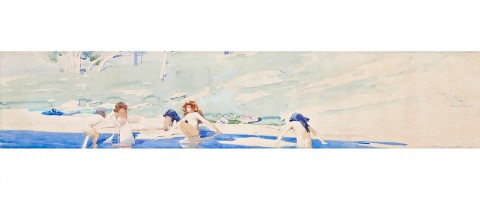A COLOUR STUDY (CHILDREN BATHING ON THE FORESHORE), 1896
ARTHUR STREETON
watercolour and pencil on paper
19.5 x 93.5 cm
signed and dated lower right: ARTHUR STREETON 1896
inscribed with title centre right: A / Colour / Study.
The Fine Art Society’s Gallery, Melbourne
Dame Rita Buxton, Melbourne
Thence by descent
Private collection, Melbourne
The Fine Art Society's Gallery, Melbourne (label attached verso)
Arthur Streeton’s love of the sea and interest in bathers as subject matter began early. In the summer of 1886, Tom Roberts and Fred McCubbin discovered the nineteen year old at Mentone ‘standing out on the wet rocks, painting’.1 His masterly Evening with Bathers, 1888 (National Gallery of Victoria), however, was painted inland at Gardiner’s Creek, Box Hill.2 The subject lent itself to broad horizontals, as later did the Sydney beaches with their endless possibilities as varied as the 1890s ‘Sunlight Sweet’ and Coogee (both in the Art Gallery of New South Wales), or Manly Beach, 1895 (Bendigo Art Gallery).3 From Claude Monet in Trouville to Roberts and Charles Conder at Mentone, beach and bathing scenes appealed greatly to the Impressionists. Their paintings, especially those by Streeton, are numbered among the masterpieces of French and Australian art, housed in the best of collections.
Streeton spent much of the summer of 1896 on the Hawkesbury River. In November he visited Melbourne to present his Sydney Sunshine Exhibition. The mighty painting ‘The Purple Noon’s Transparent Might’, 1896 was chief among the exhibited works, the first Streeton to be acquired by the National Gallery of Victoria that same year. The Hawkesbury River, 1896 and At Coogee, 1895 (both also in the collection of the National Gallery of Victoria) were similarly prominent. Critical response was justly generous, the writer for The Sun referring to Streeton’s colour as ‘glowing and transparent’, ‘the ‘open-air feeling’ of his paintings, and describing his sky as ‘a miracle of translucency’.4 While the seemingly unique A Colour Study (Children Bathing on the ForeShore), 1896 has not been identified with any in the exhibition catalogue, each word of the critic’s praise is applicable to our watercolour. By their very nature, watercolours are translucent, and the beguiling eccentricity of its elongated format echoes Streeton’s best of this time. At Coogee, which is also known as The Long Wave, Coogee, adopts a narrow format that captures ‘perfectly the long rolling surf as it breaks on the shoreline…’.5 In A Colour Study, the very long horizontal format encapsulates the lassitude of summer. An ideal setting for a sybaritic moment, it is redolent with the sensuous feel of warm sun, relaxed and carefree as the summer holidays of childhood.
Streeton was much occupied with allegorical and ancient tales during the 1890s, his 1896 exhibition included the figure paintings Oblivion, inspired by Tennyson’s Lotus Eaters, and the persuasive Scheherazade.6 Dalliance with indolence had made a striking appearance two years earlier in Dolce Far Niente.7 The figures in A Colour Study have a touch of the mythic, luxuriating in the imagined Australian landscape.
Streeton’s mastery of the technique of watercolour was as assured as his handling of oil. Throughout his oeuvre he employed it for the occasions most suited, especially in Venice and for scenes and subjects of World War One. Other highlights include the Blue Mountain Tunnel, 1891, the watercolour version of the oil painting Fire’s On, 1891, and Surveyor’s Camp, (each in the collection of the Art Gallery of New South Wales), painted the same year as A Colour Study (Children Bathing on the ForeShore). If ‘The Purple Noon’s Transparent Might’ is his most outstanding work of that year, our watercolour shares its sundrenched atmosphere beside the bluest of waters.
1. Roberts, T., quoted in Croll, R. H., Tom Roberts: Father of Australian Landscape Painting, Roberts & Mullens, Melbourne, 1935, p. 18
2. Bequest of Sunday Reed, 1982
3. Gift of Bert Levy, 1900
4.‘Mr. Arthur Streeton’, Sun, 11 December 1896, p.14
5. Clark, J. and Whitelaw, B., Golden Summers: Heidelberg and Beyond, exhibition catalogue, National Gallery of Victoria, Melbourne, 1985, p. 158
6. Oblivion, 1895 is in a private collection in Perth and Scheherazade, 1895, is in the National Gallery of Victoria through the generosity of Dr Joseph Brown
7. The whereabouts of Streeton’s Dolce Far Niente (sweetness of doing nothing) is unknown. It is illustrated in Lane, T., Australian Impressionism, exhibition catalogue, National Gallery of Victoria, Melbourne, 2007, p. 247
DAVID THOMAS
